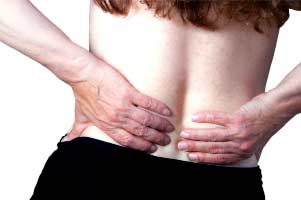Back pain is often not solely due to spinal issues but can stem from the pathology of internal organs. For example, damage to the stomach or duodenum can also lead to back pain.
 |
| Millions of people suffer from back pain, and the typical treatment is merely temporary pain relief (Image: trainright) |
Millions of individuals deal with back pain, and the usual treatment approach is to provide temporary relief. But what causes back pain? Sometimes, it originates from the spine itself, or from the connections between the internal organs and the spine. In such cases, alleviating the pain is not difficult if the underlying condition is diagnosed accurately.
The internal organs are always maintained in fixed positions even when subjected to strong impacts. To achieve this stability, each organ must be securely attached to some form of structural support. The human body has a very complex connective system that “links” the organs together and attaches them to the skeletal framework.
Given that many body parts are directly connected to the spine, any instability in this connective system can result in neck pain, back pain, or pain in the sacral region.
Fear, pain, nerve stress, and injury can all lead to the tightening or relaxation of ligaments. When the stress is removed, the tension in the ligaments should ideally return to normal levels. However, this is often not the case. If the ligaments remain overstretched for an extended period, they can become inflamed and fibrotic, usually leading to pain. Patients often experience discomfort in the spinal region (cervical, thoracic, lumbar).
Lumbar Pain Due to Duodenal Issues
The duodenum is directly anchored to the lumbar vertebrae. When it is displaced or experiences motility disorders (for example, adhesions following an appendectomy), the connecting area often becomes tense, resulting in lumbar pain.
Spinal Pain Due to Unstable Internal Organs
The diaphragm in the thoracic cavity separates the lungs from the digestive organs. It is attached to the spine via muscular legs. The diaphragm descends during inhalation and rises during exhalation, moving approximately twenty thousand times a day. To maintain this frequency, the muscular legs of the diaphragm require periods of relaxation; this is when the diaphragm fully descends.
When there are digestive disturbances such as liver pain, stomach pain (inflammation, ulcers), or pain in other organs, the ligament system may tighten, restricting motility and potentially causing displacement. Consequently, the diaphragm cannot fully descend, and the muscular legs do not get adequate rest. This overload can also lead to spinal pain.
Thus, sometimes the root cause of back pain is a gastric ulcer. An ulcerated stomach may not be painful, leading patients to be reluctant to believe they have this condition until after undergoing a gastroscopy.
Neck Pain and Lung Diseases
The upper parts of both lungs are anchored to the cervical vertebrae via a complex ligament system. When afflicted by lung or bronchial diseases, these ligaments often tighten, resulting in neck pain.
Following bronchitis, neck pain may appear suddenly, sometimes manifesting as a stiff neck upon waking in the morning. Occasionally, sudden movements, such as abruptly turning the neck, stress, or exposure to cold drafts can also lead to neck pain.
All these types of pain have causes that do not originate from the state of the spine. Merely treating the neck will not resolve the issue; sooner or later, the pain will recur.
Therefore, if back pain is not accurately diagnosed and is only treated with temporary pain relief, the underlying problem will remain unresolved. The pain will not only return but may also worsen. The damage will progress, leading to muscular and ligamentous contraction, inflammation, fibrosis, and possibly calcification, which can cause nerve compression or dysfunction.
Thus, when experiencing back pain, it is advisable to consult a rheumatologist as soon as possible. A doctor can help identify the primary cause and initiate treatment at the early stages.

















































